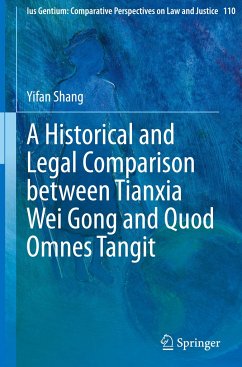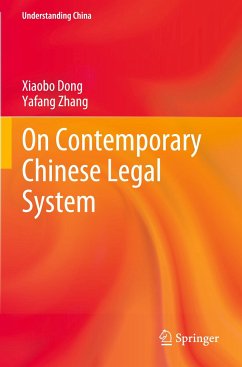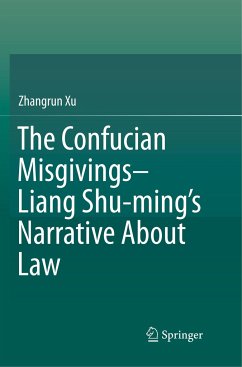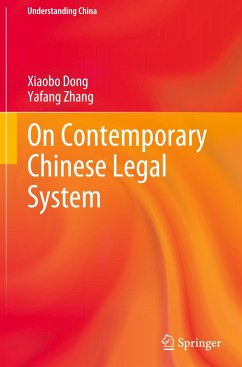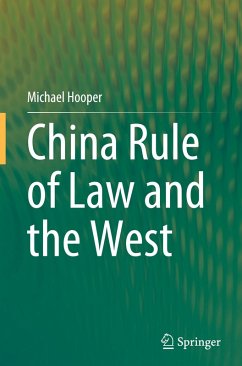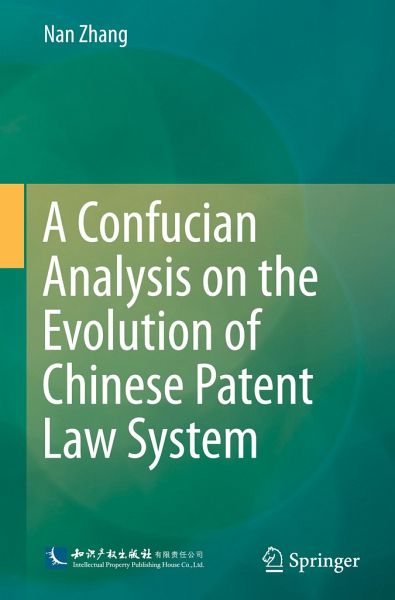
A Confucian Analysis on the Evolution of Chinese Patent Law System
Versandkostenfrei!
Versandfertig in 6-10 Tagen
113,99 €
inkl. MwSt.
Weitere Ausgaben:

PAYBACK Punkte
57 °P sammeln!
This book comprehensively discusses the main features of the Chinese patent law system, which not only legally 'transplants' international treaties into the Chinese context, but also maintains China's legal culture and promotes domestic economic growth. This is the basis for encouraging creativity and improving patent law protection in China.The book approaches the evolution of the Chinese patent system through the ancient Chinese philosopher Confucius's classic principle, offering readers a fresh new way to understand and analyze Chinese patent law reforms, while also outlining how Confucian ...
This book comprehensively discusses the main features of the Chinese patent law system, which not only legally 'transplants' international treaties into the Chinese context, but also maintains China's legal culture and promotes domestic economic growth. This is the basis for encouraging creativity and improving patent law protection in China.
The book approaches the evolution of the Chinese patent system through the ancient Chinese philosopher Confucius's classic principle, offering readers a fresh new way to understand and analyze Chinese patent law reforms, while also outlining how Confucian insights could be used to improve the enforcement of patent law and overall intellectual property protection awareness in China. It examines ancient Chinese innovation history, explores intellectual property from a Confucian perspective, and discusses the roots of Chinese patent law, as well as the past three amendments and the trends in the ongoing fourth amendment.
In addition to helping readers grasp the mentality behind the Chinese approach to patent law and patent protection, the book provides an alternative research methodology and philosophical approach by demonstrating Confucian analysis, which provides a more dynamic way to justify intellectual property in the academic world. Lastly, it suggests future strategies for local industries in the legal, cultural and sociological sectors in China, which provide benefits for domestic and overseas patent holders alike. The book offers a valuable asset for graduate students and researchers on China and intellectual property law, as well as general readers interested in Asian culture and the philosophy of law.
The book approaches the evolution of the Chinese patent system through the ancient Chinese philosopher Confucius's classic principle, offering readers a fresh new way to understand and analyze Chinese patent law reforms, while also outlining how Confucian insights could be used to improve the enforcement of patent law and overall intellectual property protection awareness in China. It examines ancient Chinese innovation history, explores intellectual property from a Confucian perspective, and discusses the roots of Chinese patent law, as well as the past three amendments and the trends in the ongoing fourth amendment.
In addition to helping readers grasp the mentality behind the Chinese approach to patent law and patent protection, the book provides an alternative research methodology and philosophical approach by demonstrating Confucian analysis, which provides a more dynamic way to justify intellectual property in the academic world. Lastly, it suggests future strategies for local industries in the legal, cultural and sociological sectors in China, which provide benefits for domestic and overseas patent holders alike. The book offers a valuable asset for graduate students and researchers on China and intellectual property law, as well as general readers interested in Asian culture and the philosophy of law.








